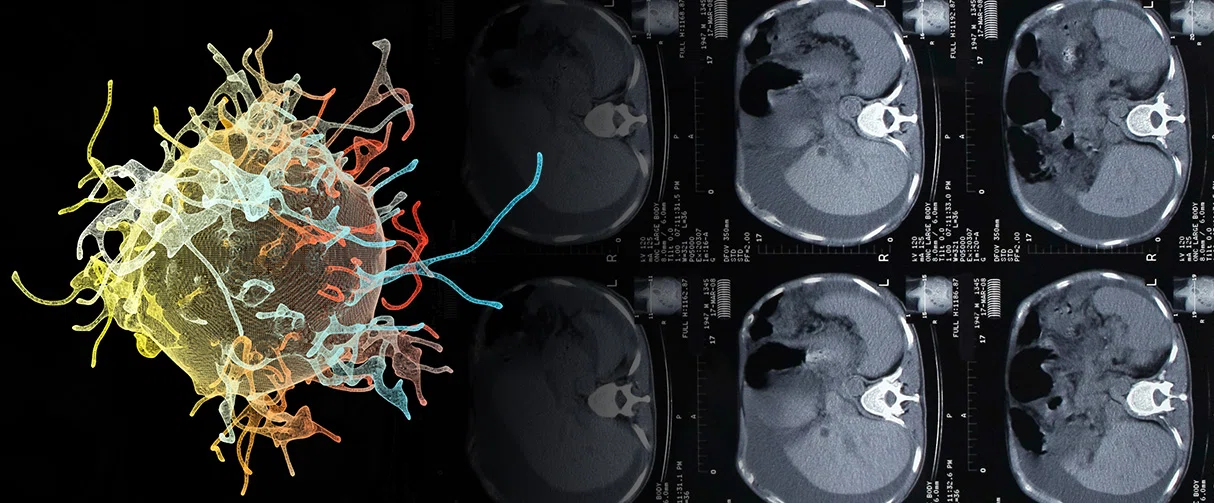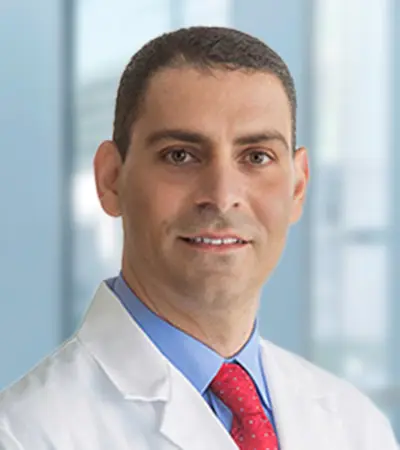


Outcomes Research
Strides Toward Improved Gastrointestinal Cancer Therapeutics
Translational research efforts spearheaded by Maen Abdelrahim, MD, pave the way for novel diagnostics and therapeutics for gastrointestinal malignancies.

One in six deaths is caused by cancer, according to the World Health Organization, which accounted for about 10 million deaths in 2020. Gastrointestinal (GI) malignancies are a major contributor to this number. By 2030, pancreatic cancer is estimated to be the second leading cause of cancer deaths. Although several clinical and surgical interventions exist, the five-year survival rate currently for pancreatic cancer is less than 10%.
Maen Abdelrahim, MD, PhD, associate professor of medicine in oncology at Houston Methodist, Section Chief of GI oncology and director at the Cockrell Center for Advanced Therapeutics, has been treating patients with upper and lower GI malignancies along with those treated with liver transplantation (LT). In several of his publications, Abdelrahim discusses the implications of transplant oncology, which encompasses oncology, transplant medicine and surgery with the overall intent to enhance patients’ quality of life and survival rates. Together with cell-free DNA (cfDNA) detection technology, transplant oncology has the potential to eliminate certain cancers, which is revolutionary.

Maen Abdelrahim, MD, PhD
CfDNA refers to extracellular DNA released from cells via apoptosis, necrosis or secretion, which can indicate disease burden or tumor. The cfDNA detection technique is significant because it can identify minimal residue disease (MRD) after curative surgery. Liver cancer patients can undergo LT, and cfDNA detection technology can indicate the presence of cancer post-LT. Although this technique cannot be used for the diagnosis of liver cancer, it can indicate cancer recurrence and organ rejection post-transplantation.
The success of transplant oncology is dependent on efficient monitoring of the tumor burden pre- and post-transplantation and identification of transplant rejection and/or cancer recurrence. The premise is to remove and replace the cancerous organ with a healthy one so that the patient becomes cancer-free.
Abdelrahim has been using the cfDNA detection technology at Houston Methodist for the past three years. In his practice, patients are monitored for cancer recurrence via the cfDNA detection technology every 4-6 months post-LT for up to 5 years. He is routinely engaged in performing LTs (183 LTs were performed in 2021) and Abdelrahim’s patients show a very promising five-year survival rate of 85%.
Another major aspect of transplant oncology is using immunotherapy before LT.
Many factors have contributed to help transplant oncology evolve from a concept toward an anti-cancer strategy, such as initiating studies in genomics and cancer immunogenomics based on new insights in liver cancer. In addition, the adoption of surgical transplantation techniques in oncology have improved conventional resection and bridged the gap between tumor and transplant immunology. The continuing collaboration between the relevant subspecialties, including transplant oncologists, hepatologists, gastroenterologists, transplant hepatobiliary surgeons, interventional radiologists, and immunologists, will improve treatments and cure rates for hepatobiliary and other cancer patients.”
Maen Abdelrahim, MD, PhD
“It usually takes six to nine months for a suitable liver to become available for a liver transplant,” said Abdelrahim. “During this time, a lot of liver cancer patients experience cancer metastasis. If the liver cancer metastasizes, the patient becomes ineligible for liver transplantation, and, as a result, drops out of the liver transplant waiting list.”
The percentage of patients eliminated from the waiting list is currently 50%. In order to reduce this percentage, Abdelrahim came up with the concept of using immunotherapy prior to the LT to reduce the tumor size as well as to prevent metastasis so more patients can be bridged to LT.
Abdelrahim currently manages the Phase I program at Houston Methodist and Neal Cancer Center while also being heavily focused on Phase II/III clinical trials in GI malignancies. Specifically, Abdelrahim is currently leading a global, international clinical study that will assess the concept of using immunotherapy prior to LT. This is the first of its kind and is led by Houston Methodist. The details of this clinical trial have been presented by Abdelrahim in national meetings including the American Society of Clinical Oncology (ASCO) and the International Liver Transplant Society.
“We have demonstrated the safety and durability of using immunotherapy before liver transplants in a small retrospective patient population. We are currently in the process of expanding and validating these results in a prospective clinical trial. Interestingly, the 5-year survival of liver cancer patients who received a liver transplant is 85% whereas the same without the liver transplant (for patients that drop out of the waiting list) is 10% or lesser,” – said Abdelrahim.
Abdelrahim also was recently appointed Section Editor-in-Chief of the Section “Transplant Oncology and Cancer Nursing Care” in the journal Cancers, which has an impact factor of 6.5.
“Many factors have contributed to help transplant oncology evolve from a concept toward an anti-cancer strategy, such as initiating studies in genomics and cancer immunogenomics based on new insights in liver cancer. In addition, the adoption of surgical transplantation techniques in oncology have improved conventional resection and bridged the gap between tumor and transplant immunology. The continuing collaboration between the relevant subspecialties, including transplant oncologists, hepatologists, gastroenterologists, transplant hepatobiliary surgeons, interventional radiologists, and immunologists, will improve treatments and cure rates for hepatobiliary and other cancer patients,” said Abdelrahim.
Abdelrahim has also been instrumental in advancing the field of pancreatic cancer therapeutics through his translational research efforts. Pro-oncogenic factors such as specificity protein (Sp) transcription factors Sp1, Sp3 and Sp4 and the orphan nuclear receptor 4A1 (NR4A1) regulate pancreatic cell and tumor growth. Abdelrahim has been focused on identifying agents that can modulate the functions of these pro-oncogenic factors to augment the efficacies of chemotherapies for pancreatic and other cancers.
Novel mechanism-based drugs for the treatment of GI cancers are on the horizon. Abdelrahim was the first to identify a new structural class of compounds that can target Sp transcription factors – which are now being assessed in Phase I clinical trials to treat GI cancer patients. Despite significant improvements in therapeutics for GI malignancies over the last decade, there is still an urgent need for better diagnostic and therapeutic approaches. Abdelrahim’s research efforts have contributed strides in this direction and additional discoveries of precise molecular targeted drugs are expected in the near future that can improve GI prognoses and alleviate the global health burden.
For further information on Abdelrahim’s work on these topics, please see the following papers:
Tejaswini Reddy, Abdullah Esmail, Jenny C Chang, Rafik Mark Ghobrial, Maen Abdelrahim. Utility of Cell-Free DNA Detection in Transplant Oncology. Cancers (Basel). 2022 Jan 31;14(3):743.
Abdelrahim, M, Esmail, A, Abudayyeh, A, Murakami, N, Saharia, A, McMillan, R, Victor, D, Kodali, S, Shetty, A, Fong, JVN, Moore, LW, Heyne, K, Gaber, AO & Ghobrial, RM. Transplant oncology: An evolving field in cancer care. Cancers 2021, vol. 13, no. 19, 4911.
Safe, S, Mohankumar, K, Howard, M, Shrestha, R, Hedrick, E & Abdelrahim, M. Transcription factors specificity protein and nuclear receptor 4A1 in pancreatic cancer. World Journal of Gastroenterology, 2021. vol. 27, no. 38, pp. 6387-6398.
Abdelrahim, M, Esmail, A, Saharia, A, Abudayyeh, A, Abdel-Wahab, N, Diab, A, Murakami, N, Kaseb, AO, Chang, JC, Gaber, AO & Ghobrial, RM. Utilization of Immunotherapy for the Treatment of Hepatocellular Carcinoma in the Peri-Transplant Setting: Transplant Oncology View. Cancers 2022, vol. 14, no. 7, 1760.
Abanti Chattopadhyay, PhD
February 2023
Related Articles





